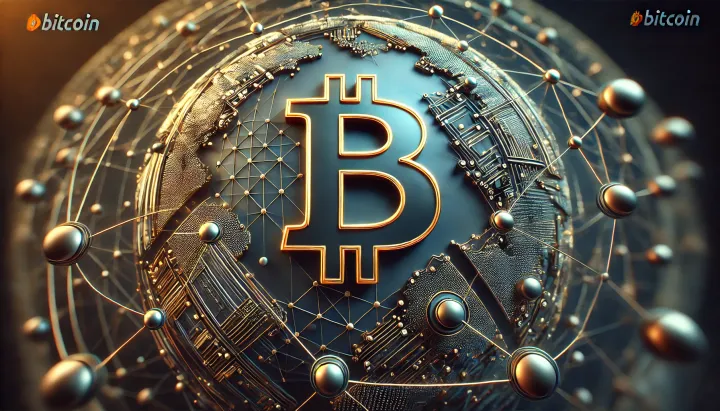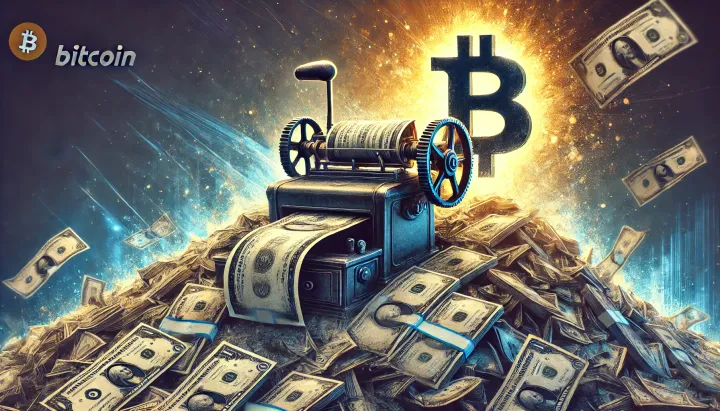Crisis and Transition: Reforming Monetary Foundations
On April 02, 2025, the Kitco News broadcast with Larry Lepard scrutinized an unsustainable monetary system marked by excessive money printing, mounting debt, and deepening wealth inequality. Lepard presented gold and Bitcoin as potential anchors for a sound money transition.

- My 'briefing notes' summarize the content of podcast episodes; they do not reflect my own views.
- They contain (1) a summary of podcast content, (2) potential information gaps, and (3) some speculative views on wider Bitcoin implications.
- Pay attention to broadcast dates (I often summarize older episodes)
- Some episodes I summarize may be sponsored: don't trust, verify, if the information you are looking for is to be used for decision-making.
Summary
On April 02, 2025, the Kitco News broadcast with Larry Lepard scrutinized an unsustainable monetary system marked by excessive money printing, mounting debt, and deepening wealth inequality. Lepard presented gold and Bitcoin as potential anchors for a sound money transition. His insights underscore an urgent need for systemic reform to avert fiscal collapse.
Take-Home Messages
- Monetary Instability: Excessive money printing undermines economic stability by fueling inflation and distorting asset values.
- Debt Vulnerability: Unchecked sovereign debt growth poses severe risks to fiscal health and market confidence.
- Wealth Disparity: Current policies exacerbate inequality by favoring asset-rich investors over ordinary citizens.
- Sound Money Alternatives: Gold and Bitcoin offer unique properties—tangible scarcity and digital verifiability—that may restore monetary integrity.
- Policy Reform Imperative: Decentralizing monetary policy and returning to market-based pricing are essential to rebalance the financial system.
Overview
Larry Lepard outlines a broken monetary framework where relentless money printing has led to inflation, mispriced assets, and unsustainable debt. He attributes these issues to a system designed to benefit elites, resulting in stark wealth disparities. His analysis is rooted in historical data and current fiscal trends.
He emphasizes that the concentration of assets among the top 1% is not incidental but a product of policies that favor debt-financed wealth accumulation. Lepard uses clear statistical evidence to illustrate how wealth inequality has intensified over decades. He argues that the current system is inherently biased.
The interview delves into the concept of an "everything bubble," where free money distorts market values across diverse asset classes. Lepard connects this phenomenon with the unsustainable growth of sovereign debt and the looming risk of fiscal collapse. His arguments frame the crisis as a predictable outcome of decades-long policy missteps.
Lepard advocates for a fundamental shift towards sound money, proposing alternatives like gold and Bitcoin as antidotes to fiat debasement. He underscores the potential of these assets to reintroduce scarcity and transparency into the monetary system. His vision calls for decisive policy action to restore market-driven pricing and economic fairness.
Stakeholder Perspectives
- Investors worry about volatility and asset mispricing that could erode portfolio value.
- Policymakers face the dual challenge of curbing unsustainable debt while restoring public trust.
- Financial institutions may resist reforms that disrupt entrenched centralized monetary controls.
- The general public is directly impacted by inflation and growing wealth disparity.
- Academics and analysts call for systemic change to ensure long-term economic stability.
Implications and Future Outlook
The discussion implies that without significant reform, the current trajectory of money printing and escalating debt could trigger a sovereign debt crisis, destabilizing markets and eroding public trust. Lepard’s analysis suggests that fiscal imbalances will eventually force policymakers into a reactive stance, with potentially severe economic repercussions.
A transition toward sound money could recalibrate economic incentives, reduce wealth disparities, and mitigate the risks associated with asset bubbles. Shifting to alternatives like gold and Bitcoin offers a path toward restoring scarcity and transparency in the monetary system. Such a reform is not only necessary for fiscal stability but also for rebalancing societal wealth.
Embracing market-driven monetary policies may foster a more resilient economic structure. Stakeholders across the board—from investors to policymakers—stand to benefit from a system that prioritizes stability and fairness. The outlook remains uncertain, but the impetus for change is increasingly compelling.
Information Gaps
- How does the current monetary system contribute to systemic economic instability? This question is critical because understanding the systemic impact of the broken monetary system informs broader economic policy and stability measures. Clarifying these mechanisms is essential for developing effective reform strategies.
- What debt-to-GDP ratio thresholds signal an imminent sovereign debt crisis? This question addresses a key risk factor that could precipitate fiscal collapse, guiding both policymakers and investors in risk management. Identifying these thresholds can provide early warning signals to mitigate broader economic fallout.
- What are the primary challenges in transitioning from fiat money to a sound money system? This question is important as it highlights both technical and political hurdles in moving toward a more stable monetary framework. Addressing these challenges is crucial for enabling a smooth transition that minimizes economic disruption.
- How does centralized monetary policy by institutions like the Federal Reserve affect market stability? This question probes the impact of central planning on economic fairness and volatility, providing insight into potential benefits of decentralizing monetary control. Its answer could shape future debates on reforming monetary policy to better serve public interest.
- How do current monetary policies influence socio-economic divisions and public trust in financial institutions? This question is significant because it connects fiscal policy with social stability and democratic accountability. Understanding this relationship is essential for addressing the broader societal impacts of monetary debasement.
Broader Implications for Bitcoin
Digital Scarcity as a Benchmark
Digital scarcity, exemplified by Bitcoin’s fixed supply, challenges traditional fiat paradigms and offers a new benchmark for monetary stability. Its algorithmic verifiability could spur innovation in financial systems by ensuring transparent and immutable records of value. This shift may incentivize broader adoption of decentralized financial practices across global markets.
Decentralized Trust and Financial Resilience
Transitioning to a decentralized monetary system can reduce reliance on centralized institutions that are prone to policy missteps. By dispersing control, a sound money system may bolster market resilience and foster trust among users. This evolution has implications for global financial stability as it diminishes the risks associated with concentrated power.
Integration of Sound Money in Global Finance
The adoption of sound money alternatives like gold and Bitcoin could redefine international monetary relations and reserve management. A shift away from fiat currency might prompt governments to reevaluate fiscal strategies and debt management practices. Broader integration of sound money may catalyze a rebalancing of economic power, influencing global trade and investment flows.



Comments ()